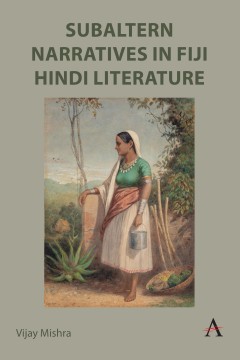Subaltern Narratives in Fiji Hindi Literature
By Vijay Mishra
Other Formats Available:
E-Book- About This Book
- Reviews
- Author Information
- Series
- Table of Contents
- Links
- Podcasts
About This Book
Subaltern Narratives in Fiji Hindi Literature is the first study of fiction written in Fiji Hindi. Its target texts are two extraordinary novels Ḍaukā Purān [‘A Subaltern Tale’] (2001) and Fiji Maa [‘Mother of a Thousand’] (2018) by the Fiji Indian writer Subramani. They are massive novels (respectively 500 and 1,000 pages long) written in the devanāgarī (Sanskrit) script. They are examples of subaltern writing that do not exist, as a legitimation of the subaltern voice, anywhere else in the world. The novels constitute the silent underside of world literature, whose foundational form – the picaresque – it adapts and interrogates. For postcolonial, diaspora and subaltern scholars, they are defining (indeed definitive) texts without which their theories remain incomplete. Theories require mastery of primary texts and these subaltern novels, ‘heroic’ compositions as they are in the vernacular, offer a challenge to the theorist.
The argument of the book takes off from Gayatri Chakravorty Spivak’s well-known declaration (later modified) that ‘The subaltern cannot speak’. Through a close examination of the two novels – and with extensive translations of passages transliterated in the roman script – it is argued that the subaltern does speak but in her own language. The subaltern speech acts in the Fiji Hindi demotic (itself an amalgam of Hindi dialects with borrowings from English and Fijian) are both private and public: private in the sense that the language (which is not to be confused with Creole English or Patois French) is an outcome of a specific historically conditioned Fiji Indian plantation experience, and public in the sense that it can be read and understood by speakers and readers of standard Hindi.
Combining deep sensitivity to language and art, the book makes a very bold claim: these books are world literary texts to which the same kind of exhaustive criticism may be applied that one would with any other great work of literature. This book brings to the reader something that has never been done before. It challenges the subaltern theorist by stipulating (axiomatically) that to understand the subaltern, one must understand her own language and not depend on redacted accounts of their experiences in metropolitan or privileged languages be they French and English or Hindi and Arabic.
Reviews
The primary virtue of Subaltern Narratives in Fiji Hindi Literature is that it gives us a comprehensive and clear idea of the richness of Subramani’s two novels. It has a finely tuned focus but pushes our thinking into a much wider vision of postcolonial writing. — Postcolonial Text
To have an eye like Mishra to capture the intricate details in the two novels is extraordinary. While he gives full justification to the language through proper linguistic analysis, he does not fail to explain the emotions in the novel often demonstrated through the words of the characters. — The Fiji Times
“We owe a great debt to Vijay Mishra for making Subramani’s two wonderful books available to us in translation, and for giving us a critical frame to understand their history and achievement. In transliteration, Subramani’s language is a revelation and dazzles with intimate details and striking ambition. As attention to oceanic literatures and the Indian labour diaspora continues to grow, Subramani’s Fiji Hindi novels and Vijay Mishra’s reading will surely and deservedly gather readers and acclaim.” — Francesca Orsini, FBA, Professor emerita, SOAS, University of London
“In his groundbreaking book, Vijay Mishra offers a scholarly but accessible study of the novels of the Fiji Indian writer Subramani. Mishra approaches these novels on their own terms, while also linking them with the traditions of folk humour, the carnivalesque and the picaresque in European literature.” — Elizabeth Jackson, Senior Lecturer in Literatures in English at the University of the West Indies (Trinidad)
“Subaltern Narratives offers English-speaking readers a profound understanding of Fiji-Hindi as a literary language, by means of extended translational analyses of two vernacular Hindi masterpieces by Subramani. In this book, Mishra dignifies both his own experience of Fiji-Hindi and the experience of other subaltern language communities around the world.” — John O’Carroll, Charles Sturt University, Australia
“The magic carpet of the Indian diaspora on which V. S. Naipaul and Salman Rushdie flew to worldwide renown is flipped in this book to reveal its granular underside. This is a sophisticated analysis of two epic novels written not in elite English but in a doubly subaltern language – a Hindi dialect vernacularized by Indian bonded labourers in Fiji. This is a dot on the world map writing back to global discourse.” — Harish Trivedi, University of Delhi
Author Information
Vijay Mishra is an emeritus professor of English and Comparative Literature at Murdoch University, Australia. His most recent work is V S Naipaul and World Literature. [Assuming it is published by March 2024]
Series
Table of Contents
Acknowledgements; A Note on Transliteration; Map of Fiji; Foreword On the Genesis of Ḍaukā Purān; Introduction Reading the Fiji Hindi Demotic; Chapter One The Shock of the New; Chapter Two The Moment of Ḍaukā Purān; Chapter Three Fījī Māṁ: the Female Subaltern Epic; Conclusion Can the Subaltern Speak? Language itself speaks; Appendix; Select Bibliography; Index
Links
Stay Updated
Information
Latest Tweets



